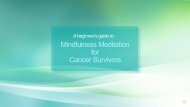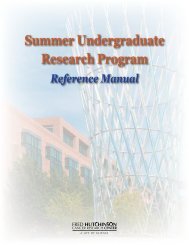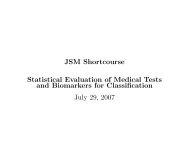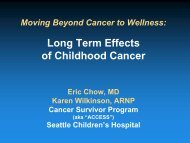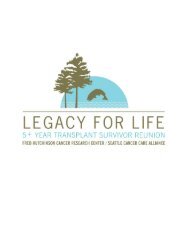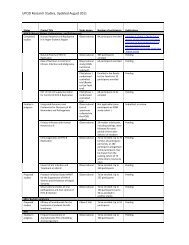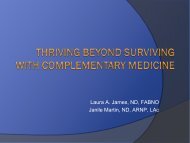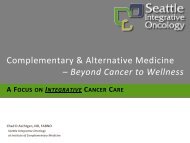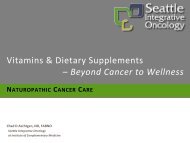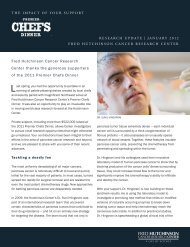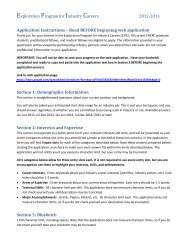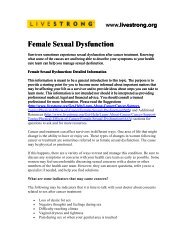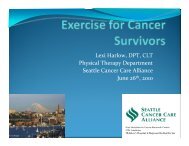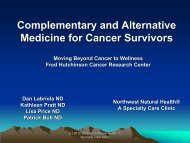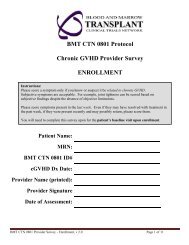discovery - Fred Hutchinson Cancer Research Center
discovery - Fred Hutchinson Cancer Research Center
discovery - Fred Hutchinson Cancer Research Center
You also want an ePaper? Increase the reach of your titles
YUMPU automatically turns print PDFs into web optimized ePapers that Google loves.
J. Lee Nelson, M.D.<br />
Autoimmunity <strong>Research</strong>er/Rheumatologist<br />
D E L V I N G I N T O T H E A U T O I M M U N E I M P L I C A T I O N S O F<br />
MOTHER-CHILD CELL SHARING<br />
It feels like a broken bone that never heals, a constant ache.<br />
Pain relievers and powerful steroids may not make a dent in<br />
the excruciating pain. Nor do they relieve the swelling and<br />
stiffness for many rheumatoid arthritis sufferers. But nature<br />
sometimes offers relief: pregnancy. Like a fog lifting, most<br />
pregnant rheumatoid arthritis patients experience life without<br />
constant pain for the first time in years.<br />
Seeing such transformations made Dr. Lee Nelson yearn for<br />
answers. What could make an autoimmune disease like<br />
rheumatoid arthritis turn off? The answer may lie in the<br />
mother-child cell transfer that happens<br />
during pregnancy.<br />
dUsing e lthe vplacenta i n g as a corridor, i n t o some<br />
cells travel between mom and baby, take<br />
up guest residence in their hosts, and<br />
stick around for decades. Nelson and her<br />
interdisciplinary team study this mixing<br />
of genetically distinct individuals, known<br />
as microchimerism, to identify the good<br />
and bad consequences of these foreign<br />
cells in autoimmune diseases, transplantation,<br />
cancer and pregnancy complications.<br />
Nelson, considered one of the world’s leading researchers<br />
in this investigative frontier, has been studying the role that<br />
microchimerism plays in the initiation and remission of autoimmune<br />
diseases since 1986, the year she began her research<br />
career at the <strong>Hutchinson</strong> <strong>Center</strong>.<br />
The transferred cells can be found in many human tissues.<br />
They are detected by looking for female cells in a male, or male<br />
cells in a female, or through DNA analysis. The presence of<br />
Y chromosomes in a woman, for example, signifies that<br />
she has acquired cells from a male (most likely from a son<br />
during pregnancy).<br />
Scientists had assumed that a normal immune system would<br />
destroy any maternal cells lingering in a child. That thinking<br />
changed when Nelson and her team found maternal cells<br />
survived decades later in healthy adults. That work<br />
provided evidence for the idea that cells transferred from<br />
mother to fetus are stem cells or related cells, capable of becoming<br />
any type of cell, since stem cells can divide indefinitely.<br />
She also found maternal cells in<br />
the pancreas made insulin, suggesting<br />
they may help regenerate the diseased<br />
organ in diabetics. This finding suggests<br />
that microchimerism might one<br />
day be the crux of new therapies if<br />
the non-native cells could be coaxed<br />
to restore damaged tissues.<br />
“We’re trying to hone in on treatments,”<br />
Nelson said. “I would like to<br />
help alleviate suffering in some way.”<br />
Nelson also conducted the first study to look at microchimerism<br />
in an autoimmune disease. She found evidence for the<br />
involvement of adopted fetal cells in scleroderma (also known<br />
as systemic sclerosis), a life-threatening illness that makes the<br />
skin hard and thick and often attacks internal organs.<br />
Once a lone pioneer in this young field, she said, “This was<br />
an interdisciplinary challenge that people had overlooked, and<br />
it was ripe for important questions and big leaps forward.”<br />
Thanks to Nelson, many of those questions are being answered.<br />
THE EXCHANGE OF MICROCHIMERIC CELLS BETWEEN MOTHER AND CHILD MAY HOLD CLUES FOR AUTOIMMUNE DISEASES.<br />
9



